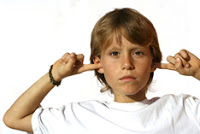HFA and Asperger’s Kids Who Show No Remorse for Bad Behavior
“My 10 y.o. has been diagnosed recently with high functioning autism. The problem we're having is that he takes no responsibility for his behavior and shows no remorse when he does something wrong. Any ideas?”
It's important for children with ASD level 1, or High-Functioning Autism (HFA), to be raised in a home environment where parents have demanded personal accountability for their actions from a very young age. Yes, these children have “special needs,” and parents will need to make “accommodations” accordingly – but not “allowances”!
Sometimes a child on the autism spectrum gets "let off the hook" because mom or dad has the attitude that "he just can't help it -- it's his disorder." Some kids hear this so often that they come to believe it. No doubt, HFA is a factor that contributes to inappropriate behavior at times, but it should never be used as an excuse for it. Unless parents demand accountability – consistently and fairly – then a youngster on the spectrum may not develop this trait naturally. So, just like social skills, “taking personal responsibility” needs to be taught.
==> How To Prevent Meltdowns and Tantrums In Children With High-Functioning Autism and Asperger's
Social skills groups for “special needs” kids can be very helpful in situations such as this. Analyzing the behavior of peers, interpreting the behavior or the consequences of certain behaviors portrayed in movies, reading stories of kids who take responsibility for their actions, and doing role-reversals and role-plays can help develop the trait of taking responsibility. This is a skill that needs to be practiced – it’s not an automatic ability that children with developmental disorders possess naturally.
Other ideas to instill a sense of accountability and responsibility include the following:
- “Survival" simulations or group problem-solving activities help kids consider the impact of their actions on others.
- Having to care for plants or animals can teach valuable life-lessons.
- Involvement in sports activities that focus on cooperative rather than competitive efforts can help.
- Religious education and scouting programs offer fertile ground for growing moral and ethical character.
- Working on community service projects, especially in the lower grades when the youngster is impressionable, is a great way to instill character.
----------
Some kids on the spectrum will pretend to be indifferent or avoid responsibility as a way to sidestep having to face up to the rather chronic impulsive acts they commit. Saying "I don't care" is often an attempt to devalue the negative act they have committed. If a child truly cares about his behavior, that carries with it the implication that he will do something about it if he misbehaves. But if he misbehaves a lot, doing something about it seems like an impossible and overwhelming task. Thus, sometimes kids have racked-up such a long list of complaints from parents that they see no way to fix it.
==> Parenting System that Significantly Reduces Defiant Behavior in Teens with Aspergers and High-Functioning Autism
Some kids on the spectrum will pretend to be indifferent or avoid responsibility as a way to sidestep having to face up to the rather chronic impulsive acts they commit. Saying "I don't care" is often an attempt to devalue the negative act they have committed. If a child truly cares about his behavior, that carries with it the implication that he will do something about it if he misbehaves. But if he misbehaves a lot, doing something about it seems like an impossible and overwhelming task. Thus, sometimes kids have racked-up such a long list of complaints from parents that they see no way to fix it.
==> Parenting System that Significantly Reduces Defiant Behavior in Teens with Aspergers and High-Functioning Autism
This is a cycle that can be broken when parents respond like this: "You say (or act) like you don't care, but that's unacceptable in this home. You need to DO something to make amends for what you’ve done (or said) – and saying a shallow "I'm sorry" doesn't cut it. The key is a change in your behavior.”
Parents of kids on the autism spectrum often worry about their child who does hurtful things TO other people (or who doesn't do helpful things FOR other people) without caring about it. These kids do have difficulty empathizing with others (more on that topic here), although this deficit is not an excuse for irresponsibility either. The longer this behavior persists, the less likely it is that it will improve. Utilizing the tips above will help most “special needs” kids become more caring and thoughtful.
Lack of Demonstrated Empathy in Kids on the Autism Spectrum
==> Tips on how to handle your child's fixations and obsessions? You'll find more than you'll need right here...
Resources for parents of children and teens on the autism spectrum:
==> How to Prevent Meltdowns and Tantrums in Children with Autism Spectrum Disorder
==> Parenting System that Reduces Defiant Behavior in Teens with Autism Spectrum Disorder
==> Launching Adult Children with Autism Spectrum Disorder: Guide for Parents Who Want to Promote Self-Reliance
==> Teaching Social-Skills and Emotion-Management to Children with Autism Spectrum Disorder
==> Parenting Children and Teens with High-Functioning Autism: Parents' Comprehensive Handbook
==> Unraveling the Mystery Behind High-Functioning Autism: Audio Book
==> Crucial Research-Based Parenting Strategies for Children and Teens with High-Functioning Autism
==> Parenting System that Reduces Defiant Behavior in Teens with Autism Spectrum Disorder
==> Launching Adult Children with Autism Spectrum Disorder: Guide for Parents Who Want to Promote Self-Reliance
==> Teaching Social-Skills and Emotion-Management to Children with Autism Spectrum Disorder
==> Parenting Children and Teens with High-Functioning Autism: Parents' Comprehensive Handbook
==> Unraveling the Mystery Behind High-Functioning Autism: Audio Book
==> Crucial Research-Based Parenting Strategies for Children and Teens with High-Functioning Autism
----------
Resources for Neurodiverse Couples:
==> Online Group Therapy for Men with ASD
==> Online Group Therapy for NT Wives
==> Living with ASD: eBook and Audio Instruction for Neurodiverse Couples
==> One-on-One Counseling for Struggling Individuals & Couples Affected by ASD
==> Online Group Therapy for Couples Affected by Autism Spectrum Disorder
==> Cassandra Syndrome Recovery for NT Wives
==> ASD Men's MasterClass: Social-Skills Training and Emotional-Literacy Development
==> Pressed for time? Watch these "less-than-one-minute" videos for on the go.



